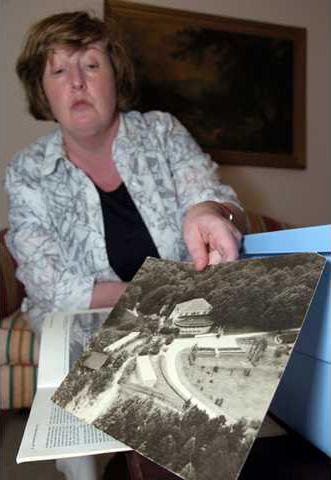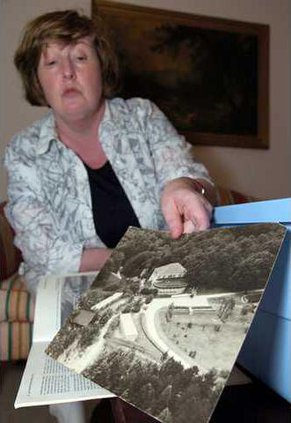About White Sulphur Springs
North of Gainesville the town of White Sulphur Springs grew in popularity as a health resort. Written ads date back to 1846, but the community really hit its stride after 1880, when Bill Miner ("The Grey Fox") robbed his last train near this Hall County community. On Feb. 18, 1911, Miner and accomplices stopped Southern Railway's No. 36 and he was captured. While in prison in Milledgeville, Miner escaped, was caught three days later and later died in prison.
The community of White Sulphur Springs did not fare much better than Miner, although it did live about 20 years longer. Purchased by J.W. Oglesby, the hotel that was the major attraction drew thousands each summer. But Oglesby liked to play the market and was fully invested that fateful October 1929. The crash cost him millions and he could no longer afford the upkeep. A fire destroyed the hotel in 1933.
Years ago, even before Gainesville became Hall County's hub, there was a bustling hotel full of lavish furniture, extravagant food and wealthy people. The travelers vacationed in Gainesville to escape the dangerous heat and deadly mosquitoes of warmer climates.
Today, there are just a few remnants of years gone by sitting on a plot of land just off Old Cornelia Highway. Several sets of stairs, now grown over with moss, a broken concrete fountain, some lamp posts and sidewalks are all that is left of the White Sulphur Springs Hotel.
"The hotel was on 400 acres of land here, so it was like a self-sufficient estate," said Cathryn Smith, who now owns the property with her sister. "People in the community worked here. It was seasonal and opened up just for the summer. It was a place to escape the heat from Savannah and other places; it was just a summer resort."
Smith's grandparents worked for the hotel and supplied the guests with fresh vegetables and milk from the family dairy.
"It means a lot to our family so we've kept it," she said. "My father (Osee Bennett) grew up here. It is just something that we like to have; some people have the lake and we have grass."
An early resort
Smith said the demise of the hotel really came after the stock market crash in 1929; then the hotel burned in 1933.
But local historian Gordon Sawyer agreed some troubles were from the stock market crash - but not all of them.
"What had happened was earlier on - beginning in the 1920s in that area - when the automobile came out, people drove a whole lot of other places," he said. "But the big one was that somebody found out that in 1918-1920, somewhere like that, that if you can control the mosquitoes, you can control the fever. And so when that came about people weren't afraid any longer to go to South Florida.
"The wealthy people up North and the wealthy people on the coast ... took off to Miami rather than coming to the mountains."
But before the popularity of South Florida, Sawyer said the White Sulphur Springs Hotel was the "class place to go."
"The pattern you have is pretty much the pattern that you see in New England where people from New York or Boston had places up in Maine and New Hampshire," he said. "Somewhere before the Civil War it was running pretty well as a resort ... a place where a whole lot of people down on the coast - mostly plantation owners and ship captains, merchants, those kind of people — built homes in the Habersham area and came there."
All the amenities
During its heyday, the White Sulphur Springs Hotel was well equipped with all of the resort amenities, even some of those expected at today's hotels. The sulphur spring served as a "medicinal spring," the spa of the day.
"They had the first cement swimming pool in Northeast Georgia here," Smith said. "This was the time before penicillin and sulphur to drink would be good for you with vitamins and minerals, and it had chlorine in it so it was clean and it would be good for you."
There also were wide porches, parlors, a dining room built to accommodate 100 guests, a bowling alley, a grass tennis court, sleeping porches and numerous cottages with running water, electric lights and baths.
"White Sulphur was not a huge building," Sawyer said. "It had the center building where you had the dining room and you had all the stuff that was in there that you needed in a club house, if you will. That is the comparison we make now.
"There were 40 cabins around, located all of them in walking distance of the spring - the place where you could walk down and got healthy, if you will ... it was one of those classic places."
A mother's peace
Even with all of these amenities, rest and relaxation for mothers may have been the most priceless part of a vacation at the hotel during the summer.
"White Sulphur had an ad that was run in a magazine ... and it said that White Sulphur Springs was a cure for female derangements," Smith said. "If you lived in Savannah or in Atlanta and it is hot and you have six children - everybody had six children or more - this was a place that husbands would stay wherever they were to work. They would ship the wife and children away; you would come up here, turn the children loose."
According to Smith, the doctor on duty at the hotel would tell the women to go to bed for three days and drink the water.
"It had iron in it, vitamins, minerals ... all those vitamins you need the water had in it, and of course you would feel better," she said. "The women would get their rest, the children would have to play, you didn't have to cook, you were taken care of and people were escaping malaria."
The spring itself was covered with a gazebo, allowing guests to lounge while drinking the medicinal water.
"The spring is a hole in the ground now," said Smith, who added that the spring water is ice cold. "The sulphur that surrounds the spring actually is this white stringy stuff that looks like ... spider webs."
Today the gazebo that covered the spring is no longer there and the land is overgrown with trees and weeds. But there still are some local residents interested in the historic hotel.
Vicki Chambers, a Lula council member, has also been looking into the history of the hotel and discovered she had family members connected with the resort.
"Some of my family actually ran the post office down at White Sulphur and back in the late 1880s, and that is where my interest sparked," she said. "Merriman Jones ran the post office at White Sulphur Springs; he is a great-great uncle.
"There is just nothing left you can see anymore. It is a shame because it really was a big thing for this area."
Added Smith, "I think it is nice to have the past and I think it is good for any community that there was something before them ... that is nothing like it was 100 years ago, but time marches on."

